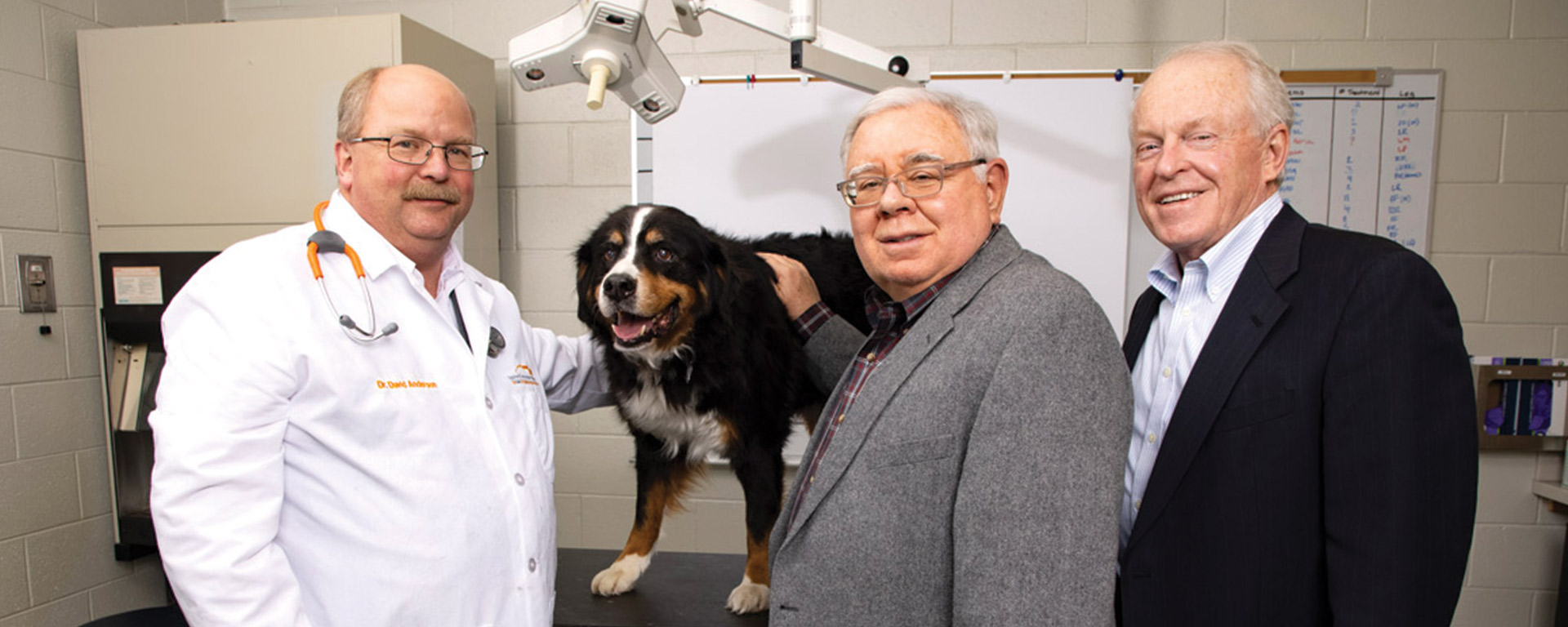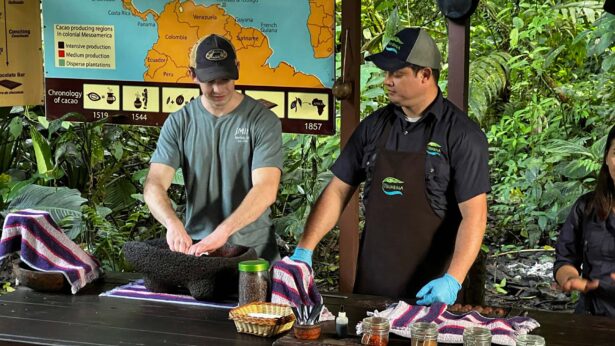Featured photo: David Anderson, Ady the dog, Jack Lacey and Ed Pershing
Ed Pershing, Knoxville ’74, founded Pershing Yoakley and Associates, which became one of the nation’s largest accounting and health-care consulting firms. He is chairman of Provectus Biopharmaceuticals.
Jack Lacey, Knoxville ’70, UTHSC ’73, worked as a general internist and later as chief medical officer of UT Medical Center in Knoxville. He is a board member of Provectus Biopharmaceuticals.
A destroyer of physical and emotional health, cancer also robs us in financial ways, leaving many bankrupt and creating life-long hardship for others. It is a burden that many simply cannot carry. Two University of Tennessee graduates are trying to do something about it.
Dr. Jack Lacey and Ed Pershing have a long history of partnering to help the people of Tennessee overcome overwhelming health-care challenges. Now they have set their sights on developing cost-effective cancer treatments for people and animals.
How did your partnership come about?
Pershing: We discovered each other’s passion for making a difference in the lives of Tennesseans and have partnered over the years to build community-based organizations designed to make health care more accessible and affordable. One of these, Knoxville Area Project Access, has now provided more than $350 million in donated medical care for some 40,000 uninsured Tennesseans.
The National Cancer Institute states that cancer is one of the most expensive diseases to treat. Describe how this data catalyzed your partnership into action again.
Lacey: Both of us have looked for ways to ease the financial strain of medical care while delivering the best care to everyone and also to create educational and economic opportunities for our East Tennessee community. So, when Ed asked me to join him in this Tennessee-based biotechnology company (Provectus Biopharmaceuticals) that was exploring ways to treat cancer safely, effectively and affordably, I thought this could be our most exciting challenge and most important opportunity yet.
Why is that?
Pershing: Cancer victims, beyond the physical and emotional toll, face tremendous financial-driven anxiety and difficulty. They are nearly three times more likely to file for bankruptcy. To Jack and me, affordability means drug access for all Tennesseans and certainly for cancer patients in poorer nations around the world.
Lacey: Medically, the underlying science is remarkable. Provectus’ developmental cancer drug uses a small molecule that attacks and kills many types of tumor cells but, importantly, does not harm healthy cells. Treatment with the drug also calls the body’s own immune defenses into action to continue the fight safely and effectively. So far, more than 450 patients have had their skin and liver cancers treated in Provectus’ clinical trials and compassionate-use programs with promising results.
So what’s your next step?
Lacey: While we continue to collaborate with cancer specialists at UT Medical Center, Knoxville and other academic centers in the United States, Canada, France and Australia to further demonstrate how Provectus’ drug impacts different types of cancer in clinical trials and from compassionate use, we are also working towards getting the drug approved for the treatment of a rare type of melanoma. In addition, Provectus recently received a $2.5 million grant from the state of Tennessee to develop a cancer treatment for dogs and other animals by partnering with the UT College of Veterinary Medicine; Dr. David Anderson, associate dean for research; and his veterinary specialist colleagues.
Pershing: We are seeking additional financial support to develop drugs from this unique science for other health challenges, including infectious and dermatologic diseases, with the ultimate goal of manufacturing a host of cost-effective medicines right here in Tennessee.



